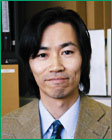Q: While bipolar disorder is a familiar disease affecting 1% of the population, the factors that contribute to the disorder are still unknown.
A: Yes, this is true. In my research, I suspect that individual differences or mutations in mitochondrial DNA in the cytoplasm may contribute to the pathogenesis of the disease.
Q: Why did you choose to research bipolar disorder?
A: As a clinical psychiatrist working at Shiga University of Medical Science, I began to care for bipolar disorder patients.
One evening, a patient who had been in a depressive state complained of restlessness and asked me for help. Prophylactics and sleeping pills were not effective, and I had done all that I could, but the patient’s restlessness continued. By the following morning, this patient entered into the manic state and began chatting loudly. That was the first time I witnessed the characteristic transformation of this disorder overnight.
As a result of this experience, I began to think that modern science should be able to identify how the sudden shifts from depressive to manic states occur. My inability to help that troubled patient direct my efforts toward discovering the cause of the disease.
Q: What research did you do before coming to BSI?
A: In my first year as a trainee, I heard about a method for chemical analysis of the brain by using nuclear magnetic resonance (NMR). While the procedure is more common now, in 1989 when I moved to the Shiga University of Medical Science, MRI systems and MRI-based diagnoses were still very new.
Instead of examining brain structure by using MRI systems, I began conducting chemical analyses of the brain to find possible insight into the causes of the disease. Few scientists were studying brain metabolism in patients with mental disorders at that time. Each day, I was amazed as I observed chemical states in patients’ brains that no one had seen before.
Eventually I noticed that the states I observed in bipolar disorder cases were similar to those reported for mitochondrial-dysfunction related diseases. Therefore, I began to analyze mitochondrial DNA.
Q: Why did you come to BSI?
A: I had proposed many projects to investigate the relationship between bipolar disorder and mitochondrial DNA, but conducting such experiments as a part of clinical work at a university was actually impossible.
At the time BSI issued an invitation to researchers of mental disorders. I hesitated because of the time limits imposed on projects at BSI: a position there is a high-risk, high-return job. I also thought that clinical and educational works were just as important as research. Eventually, I realized that the only way I might be able to find a solution to the causes of bipolar disorder would be through a research project at BSI.
Q: What about BSI has most impressed you?
A: I experienced culture shock during my selection interview. My interviewers said, “your plans are OK but they are too small.” All those ambitious research projects that I had proposed at academic meetings, were considered too small for research at BSI. A broader viewpoint was required to develop major projects at RIKEN.
My proposed projects were either already done or actively pursued, and I am delighted to know that my ideas are now becoming popular. Recent papers from foreign researchers also reported the relationship between bipolar disorder and mitochondria. In addition, a pharmaceutical company in US announced that a drug focusing on mitochondrial diseases is also effective against bipolar disorder. I am grateful to the efforts of my staff for this shift in research is based on their hard work.
I have wanted to study psychology or psychiatry since junior high school, and I entered a medical university for this purpose. If we can identify the causes of bipolar disorder, then it might also be possible to elucidate the molecular mechanisms that control human emotions. Elucidating such mysteries of the mind and brain was a dream of mine, which is gradually being realized.






